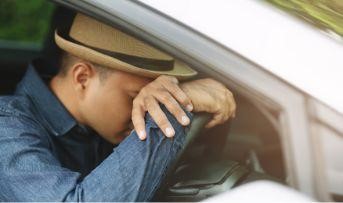Blog Details - Magma HDI

Drowsy driving: Its implications and how to avoid it 28th February 2023
Driving is a skill that requires utmost responsibility while behind the wheel. While several uncontrollable factors cause accidents, motorists must always ensure they are non-negligent, careful, and alert while driving to minimise the risk of accidents.
One controllable factor that may lead to mishaps is drowsy driving. While sleep is uncontrollable, one must never drive in a dazed state of mind. While car insurance renewal may cover the loss to your vehicle, it does not suffice for the mental and physical trauma that results from accidents.
If you frequently feel drowsy while at the wheel, here are some tips to shake off the haze and drive alertly!
1. Break up your driving frequently:
Take a brief break from driving every 100 miles or two hours, regardless of how well you've slept the night before. Plan your route so that you may frequently stop to stretch, get some fresh air, and grab a snack or refreshing drink.
2. Drive cautiously at the drowsiest hours of the day:
Since your body's internal clock tends to make you sleepier between midnight and six in the morning and early afternoon, try to avoid driving during those times.
3. Sleep well at night:
A restful sleep of seven to eight hours is essential before a lengthy journey. When you feel drowsy, park at a safe spot and take a quick power nap.
4. Travel with a friend:
Bring along a passenger who can share driving chores and keep you awake because most drowsy driving occurs during a solo journey.
5. Avoid night-time driving:
Avoid driving at night if possible because it makes people sleepier and less aware. If you work a second or third shift, abstain from driving when your body is most used to sleeping.
6. Avoid using sedatives and alcohol:
Alcohol and other sedative drugs disrupt your sleep and make you feel sleepy the next day. Avoid driving under the influence of alcohol or any other drug.
7. Consider your health:
If you frequently have difficulties falling asleep, speak with your doctor to see what the issue might be. As with sleep apnea or narcolepsy, modest signs of exhaustion can occasionally indicate more severe health problems.
8. Get a caffeinated drink:
Pull up to a petrol station and buy a coffee, tea, soda, or energy drink for a fast dose. Caffeine enters the system and starts its impact after a half-hour. So, if you regularly consume it, you might not get the appropriate benefit.
9. Be alert for cautionary signs:
Look for an instant opportunity to stop and relax if you have any drowsiness. Don't try to push through if you're exhausted. Always remember that it's better to be safe than sorry.
10. Engaging radio programs to hear:
Turn on an exciting radio program to keep your mind engaged and awake if you're travelling alone or your passenger's talk has run dry.
11. Watch out for sleep-inducing tricks:
Some individuals use their windows, air conditioning, or radio to make themselves more alert, but doing so can take your focus off the road. It is preferable to pause and give your body the rest it requires rather than using these tactics.
12. Do not rush things:
Give yourself some additional time to react on the impromptu roadside excursions. Being rushed increases your chance of an accident and injury and decreases your likelihood of taking the necessary driving breaks.
Getting enough sleep is the best defence against drowsy driving over the long term. Focusing on your sleep hygiene, which includes your routines and environment, can help prevent drowsiness while driving.
You can endanger yourself and others if you find yourself nodding off while driving. We encourage you to undertake timely car insurance renewal to minimise the risk of accidents and efficiently deal with damages due to mishaps.
Click HERE to get your car insurance renewal done.
Disclaimer: The information provided above is for illustrative purposes only. To get more details, please refer to policy wordings and prospectus before purchasing a policy.

